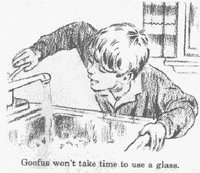
Big Dave, R.I.P.
Our outdoors cat, Big Dave, died a few days ago. A little over four years ago, he had had acute kidney failure, which is curable in cats, but which left him with kidney damage. Over time, he started losing weight, and over the last few weeks the weight just dropped off of him. He wasn't unhappy, though, and was still eating, drinking, and trying to bring down birds, so we waited for the inevitable. Then he vanished. After a few days, we assumed he was dead, and were confirmed by a visit yesterday from our over-the-fence neighbor, who had found Big Dave lying in the shade under the bamboo patch. He knew Big Dave as "Grump," and had been feeding and watering him as the cat hunted critters among the bamboo in his back yard. He'd buried him, and then asked around just in case "Grump" had some other owner. We visited the grave and Offspring #1 shed some tears. I need to bake our good neighbor some brownies.
Big Dave was born just "Dave" in upstate New York, where his owners kept the little kitten in spite of a no pets rule in their flat. When Dave grew into a monstrous and unhideable cat of close to thirty pounds, he was given to the local cat shelter. One winter day, while grieving the death of my dear tiny cat Caliche, I was visiting the bookstore and browsed among the cat shelter adoption display. There, in a cage by himself, was the largest cat I had ever seen. The sign on the cat said "Big Dave." First I thought, "What a brute!" Then I thought, "I must have that cat."
Big Dave was no teddy bear, even though he looked like one. He terrorized our other cat, Phil the pacifist kitty, though we managed to enforce a detente eventually. He had no charity towards small creatures, including babies and toddlers, and when I was pregnant with Offspring #2, I knew Big Dave was going to have to become an outdoor kitty. Out he went, and soon became a (mostly) changed cat. His temper mellowed, and he would let small children pet him without becoming too irritated. He lost the fat and trimmed down to his fighting weight of about twenty pounds. Did I mention he was a large cat? Twenty pounds of fur, muscle, and bad attitude. A lean, mean, dog-fighting machine.
He soon had a neighborhood reputation as scourge of the canines. Once, a woman let her leashed toy dog wander up well onto our lawn to do its doggy business. I was just opening the door to ask her not to do that, when a large gray blur streaked out of the bushes and went for the dog. Big Dave was all over that dog like a cheap suit. The woman stared, uncomprehending, while I grabbed for what looked like the midsection of the cat and pulled him off the poor trembling creature. I apologized--"He doesn't like dogs in his yard"--she apologized, we removed our respective animals from the scene; I'm guessing she probably curbed the dog properly from then on.
His dog-fighting days ended (mostly) when, one evening, some neighbors were walking their well-behaved mid-sized dogs, on leashes, in the street, and suddenly Big Dave got it in his head that he could take both of them on. There was the familiar streak out of the bushes, but this time he was older, the dogs were bigger and plural, and he lost the fight in a big way. The owners strained to pull their dogs off the downed cat, while Eudoxus bravely waded into the fight and extricated Big Dave. Before we could take him to the vet next morning, Big Dave took off for a few days of licking his physical and psychological wounds, and came back a chastened kitty. Except for one incident with an escaped labrador that refused to leave our yard, and ended with a scene out of Wild Kingdom where the lion is hanging on to the back of the frantic zebra, tearing away as the panicked prey flees for its life, Big Dave left the dogs to themselves from then on. He contented himself with bringing down the phenomenally stupid mourning doves that infest the grassy places of Central Texas ("Coo-coo coooo! Hey, where'd Fred go? Coo-coo coooo!")
Big Dave was a guy cat. He liked men, not women or children, and men loved him. Several neighborhood guys routinely stopped by our house on evening walks or jogs and waited for Big Dave to run out to the curb for admiration and petting. When I'd give the vet my cat's name, men in the waiting room would smile and say "Yeah! Big Dave! There's a real cat." Our vet, a huge Texas guy himself, loved him. "Here's Big Dave. How's the big guy today?" When he disappeared after the big dog fight, and I was asking neighbors for blocks around if they'd seen him, I was mortified by the number of women who frowned and said they knew that cat; he was always beating up their pets. But the men would say the same thing with admiration.
Big Dave. Chasing errant dogs in heaven, or wherever. Thanks for being a real cat, big guy.







